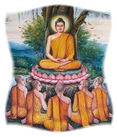Kenneth J. Swanson
It has been seven months since I sat down to write this. To me, it would be easier to answer the Zen Koan “What is the sound of one hand clapping?” I know that clapping involves two hands, so there is no logical answer to this question. I feel that this course has not been about what “was” stated, but “how” it was stated in order to make me think into the nature of reality. In my humble way, I will try to explain Buddhism from my perspective.
Buddhism began about 2500 years ago in Northeast India. It is based on the teachings of an Indian noblemen Siddhartha Gautama, born 563 BCE in Kapilavastu, India, who became the Buddha, and enlightened, after many years of fasting and hardship in the village of Bodh Gaya. He realized that because people suffered because they wanted more than they had.
Buddhists do not worship Buddha as a god, but honor him as a great teacher. They follow his teaching as a guide to living and understanding the world. Today, there are approximately 360,000,000 Buddhists in the world.
Buddha traveled and taught for about 45 years after his enlightenment. Nothing he said was written down during his lifetime. But he entrusted individuals with memorizing each discourse. He died at the age of 80 in Kushinagara, India. According to legend, before his death he stated “do not accept any of my words on faith, believing them just because I said them. Be like an analyst buying gold who cuts, burns, and critically examines his product for authenticity. Only accept what has passed the test by proving useful and beneficial in your life.” This statement gives Buddhists the power to accept or reject anything said by the Buddha or his disciples.
Like Christianity or Islam, Buddhism is a misisionary religion. Within 300 years after Buddha’s death, it spread beyond India and reached Ceylon (now Sri Lanka). Monks and travelers carried it to other parts of Asia. It reached Japan and Tibet in the Seventh Century.
According to Buddhism, liberation is attained through understanding and practice of the Four Noble Truths:
* There is suffering in life
* Suffering is caused by desire for pleasure, existence, and prosperity
* Suffering and rebirth cease when one ceases such desires leading to enlightenment (or Nirvana), a blessed state in which peace, harmony, and joy are attained.
* The way, or path, to Nirvana is the Eightfold Path, which is:
o Right understanding’
o Right thought
o Right speech
o Right conduct
o Right occupation
o Right meditation
o Right mindfulness
o Right effort
The Eightfold Path is also called the Middle Way because it emphasizes avoiding such extremes as following sensuous pleasures on one hand and self-punishment on the other. A Buddhist must at all times observe the high moral principles in the Eightfold Path which emphasizes non-violence and the brotherhood of all.
The best-known Buddhist scriptures are the Tripitake (“Three Baskets”). First written down in Ceylon by the Sixth Buddhist Council held at Rangoon, Burma in 1954-56. The three Pitakas are about four times as long as the Bible.
There are two major groups in Buddhism: Theravada and Mahayana. The name Theravada means “the way of the elders.” It is an austere religion that requires solitude, meditation, and self-mastery through which each follower hopes to achieve Nirvana. Because of these requirements, the possibility of liberation is limited to monks and nuns who spend most of their time in meditation and teaching. It is sometimes called “Hinayana Buddhism,” or “Small Vehicle.”
The Mahayana means “Large Vehicle.” It is less austere than Theravada, and it emphasizes liberation for everyone. Many Mahayana Buddhists believe in liberation through good faith and good works. Their object in life is not only to obtain Nirvana, but to help others to that goal. The Mahayanas have developed a system of Buddhas. The most important Buddha is Amitaba (or Amida), to whom appeals for deliverance can be made. Some Mahayana Buddhist also believe in a boddisatvas called Kwan Yin (in China) and Kwannon (in Japan), or Jizo, in Japan.
Many hundreds of texts make up the sacred texts of Buddhism. Different Buddhist groups follow their own sets of scriptures. Some texts are said to be accounts of the Buddha’s teachings, and others are works of great Buddhist monks and teachers. The sacred texts of the Theravada Buddhists are collected together in the Tripitaka or Pali Canon. The sacred texts of the Mahayana Buddhists are called Sutras.
To me, Buddhism is a way of seeing things as they present to me. I have a favorite Zen saying: “When you see horns over the hedge, you know there is an ox on the other side.” We spend so much time in our lives questioning what things mean—interpreting and analyzing; and sometimes you need to just accept what is there in front of you at that moment, and deal with that, fully, living in the moment.
Kenneth J. Swanson, Rev.
*******************************
The Universal Life Church is a comprehensive online seminary where we have classes in Christianity, Wicca, Paganism, two courses in Metaphysics and much more. I have been a proud member of the ULC for many years and the Seminary since its inception.
The Universal Life Church offers handfasting ceremonies, funeral ceremonies and free minister training.
As a long time member of ULC, Rev. Long created the seminary site to help train our ministers. We also have a huge selection of Universal Life Church minister supplies. Since being ordained with the Universal Life Church for so many years and it's Seminary since the beginning, I've watch the huge change and growth that has continued to happen.
Try our new free toolbar at: ULC Toolbar

No comments:
Post a Comment